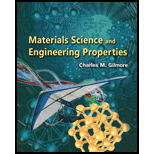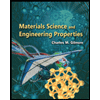
Materials Science And Engineering Properties
1st Edition
ISBN: 9781111988609
Author: Charles Gilmore
Publisher: Cengage Learning
expand_more
expand_more
format_list_bulleted
Question
Chapter 9, Problem 24CQ
To determine
Whether the cross-linked and three dimensional covalent bonds creep in thermoset polymers or not.
Expert Solution & Answer
Want to see the full answer?
Check out a sample textbook solution
Students have asked these similar questions
Narrow bars of aluminum are bonded to the two sides of a thick
steel plate as shown. Initially, at T₁ = 70°F, all stresses are zero.
Knowing that the temperature will be slowly raised to T₂ and then
reduced to T₁, determine (a) the highest temperature T₂ that does
not result in residual stresses, (b) the temperature T₂ that will
result in a residual stress in the aluminum equal to 58 ksi. Assume
aa = 12.8 x 10-6/°F for the aluminum and a = 6.5 × 10-6/°F for
the steel. Further assume that the aluminum is elastoplastic with
E = 10.9 × 106 psi and ay = 58 ksi. (Hint: Neglect the small
stresses in the plate.)
Fig. P2.121
An aluminum alloy [E = 67 GPa; ν = 0.33; α = 23.0 × 10–6/°C] plate is subjected to a tensile load P. The plate has a depth of d = 225 mm, a cross-sectional area of A = 5100 mm2, and a length of L = 4.1 m. The initial longitudinal normal strain in the plate is zero. After load P is applied and the temperature of the plate has been increased by ΔT = 63°C, the longitudinal normal strain in the plate is found to be 2900 με. Determine:
(a) the magnitude of load P.
(b) the change in plate depth Δd.
Stress Analysis of Trusses
Chapter 9 Solutions
Materials Science And Engineering Properties
Ch. 9 - Prob. 1CQCh. 9 - Prob. 2CQCh. 9 - Prob. 3CQCh. 9 - Prob. 4CQCh. 9 - Prob. 5CQCh. 9 - Prob. 6CQCh. 9 - Prob. 7CQCh. 9 - Prob. 8CQCh. 9 - Prob. 9CQCh. 9 - Prob. 10CQ
Ch. 9 - Prob. 11CQCh. 9 - Prob. 12CQCh. 9 - Prob. 13CQCh. 9 - At temperatures above the equi-cohesive...Ch. 9 - Prob. 15CQCh. 9 - Prob. 16CQCh. 9 - Prob. 17CQCh. 9 - Prob. 18CQCh. 9 - Prob. 19CQCh. 9 - Prob. 20CQCh. 9 - Prob. 21CQCh. 9 - Prob. 22CQCh. 9 - Prob. 23CQCh. 9 - Prob. 24CQCh. 9 - Prob. 25CQCh. 9 - Prob. 26CQCh. 9 - Prob. 27CQCh. 9 - Prob. 28CQCh. 9 - Prob. 29CQCh. 9 - Prob. 30CQCh. 9 - Prob. 31CQCh. 9 - Prob. 32CQCh. 9 - Prob. 33CQCh. 9 - Prob. 34CQCh. 9 - Prob. 35CQCh. 9 - Prob. 1ETSQCh. 9 - Prob. 2ETSQCh. 9 - Prob. 3ETSQCh. 9 - Prob. 4ETSQCh. 9 - Prob. 5ETSQCh. 9 - Prob. 6ETSQCh. 9 - Prob. 7ETSQCh. 9 - Prob. 8ETSQCh. 9 - Prob. 9ETSQCh. 9 - Prob. 10ETSQCh. 9 - Prob. 11ETSQCh. 9 - Prob. 12ETSQCh. 9 - Prob. 9.1PCh. 9 - Prob. 9.2PCh. 9 - Prob. 9.3PCh. 9 - Prob. 9.4PCh. 9 - Prob. 9.5PCh. 9 - Prob. 9.6PCh. 9 - Prob. 9.7PCh. 9 - Prob. 9.8PCh. 9 - Prob. 9.9PCh. 9 - Prob. 9.10PCh. 9 - For silver at a tensile stress of 7 MPa and a...Ch. 9 - For germanium at a tensile stress of 410 MPa and a...Ch. 9 - Prob. 9.13PCh. 9 - Prob. 9.14PCh. 9 - Prob. 9.15PCh. 9 - Prob. 9.16PCh. 9 - Prob. 9.17PCh. 9 - Prob. 9.18PCh. 9 - Prob. 9.19PCh. 9 - Prob. 9.20PCh. 9 - Prob. 9.21PCh. 9 - Prob. 9.22P
Knowledge Booster
Similar questions
- An aluminum alloy [E = 72 GPa; v = 0.33; a= 23.0 x 10-6/°C] plate is subjected to a tensile load P. The plate has a depth of d = 245 mm, a cross-sectional area of A = 5500 mm², and a length of L = 6.0 m. The initial longitudinal normal strain in the plate is zero. After load P is applied and the temperature of the plate has been increased by AT = 69°C, the longitudinal normal strain in the plate is found to be 3340 μc. Determine: (a) the magnitude of load P. (b) the change in plate depth Ad. L P Answer: (a) P = i (b) Δd = i KN mmarrow_forwardAn aluminum alloy [E = 69 GPa; v = 0.33; a = 23.0 x 10-6/°C] plate is subjected to a tensile load P. The plate has a depth of d = 215 mm, a cross-sectional area of A = 5100 mm2, and a length of L = 3.9 m. The initial longitudinal normal strain in the plate is zero. After load P is applied and the temperature of the plate has been increased by AT = 53°C, the longitudinal normal strain in the plate is found to be 2320 με. Determine: (a) the magnitude of load P. (b) the change in plate depth Ad. L Answer: (a) P = i (b) Δd = = i d KN mmarrow_forwardWithin elastic limit, stress is O(A) Inversely proportional to strain O(B) Directly proportional to strain OCC) Square root of strain O(D) Equal to strainarrow_forward
- Draw a tensile stress-strain curve for a typical semi-crystalline polymer such as LLDPE, and define the three main regions on the curve.arrow_forwardA steel 0.6 inch×1.2 inch steel 90 m long is subjected to a 45 KN tensile load along its lenght.If poison's ratio is 0.3 Find: A. The deformation along its lenght. B. The deformation along its thickness. C. The defirmation along uts width. D. The lateral strain.arrow_forwardThe deformation per unit length is called O(A) Tensile stress O(B) Compressive stress OCC) Shear stress O(D) Strainarrow_forward
- -6 The aluminum shell is fully bonded to the brass core and the assembly is unstressed at a temperature of 16°C. It is known thatE = 105 GPa and a = 20.9 × 10 °C for the brass core and E = 71 GPa and a = 23.8 × 10¯6°C for the aluminum shell. Considering only axial deformations, determine the stress in the aluminum when the temperature reaches 185°C. 25 mm σα MPa -63 mmarrow_forwardstresses in beamsarrow_forwardAn aluminum alloy [E = 70 GPa; v = 0.33; a = 23.0×10-6/°C] bar is subjected to a tensile load P. The bar has a depth of d = 260 mm, a cross-sectional area of A = 14720 mm2, and a length of L = 5.5 m. The initial longitudinal normal strain in the bar is zero. After load P is applied and the temperature of the bar has been increased by AT = 46°C, the longitudinal normal strain is found to be 1680 µɛ. % D Calculate the change in bar depth d after the load P has been applied and the temperature has been increased. L P Answer: Ad = i mmarrow_forward
arrow_back_ios
arrow_forward_ios
Recommended textbooks for you
 Materials Science And Engineering PropertiesCivil EngineeringISBN:9781111988609Author:Charles GilmorePublisher:Cengage Learning
Materials Science And Engineering PropertiesCivil EngineeringISBN:9781111988609Author:Charles GilmorePublisher:Cengage Learning

Materials Science And Engineering Properties
Civil Engineering
ISBN:9781111988609
Author:Charles Gilmore
Publisher:Cengage Learning